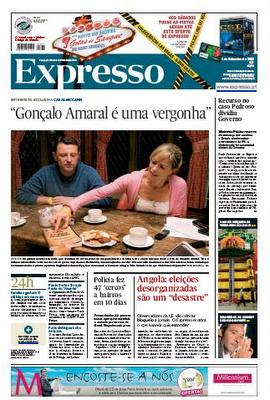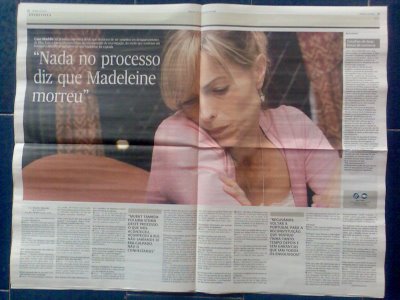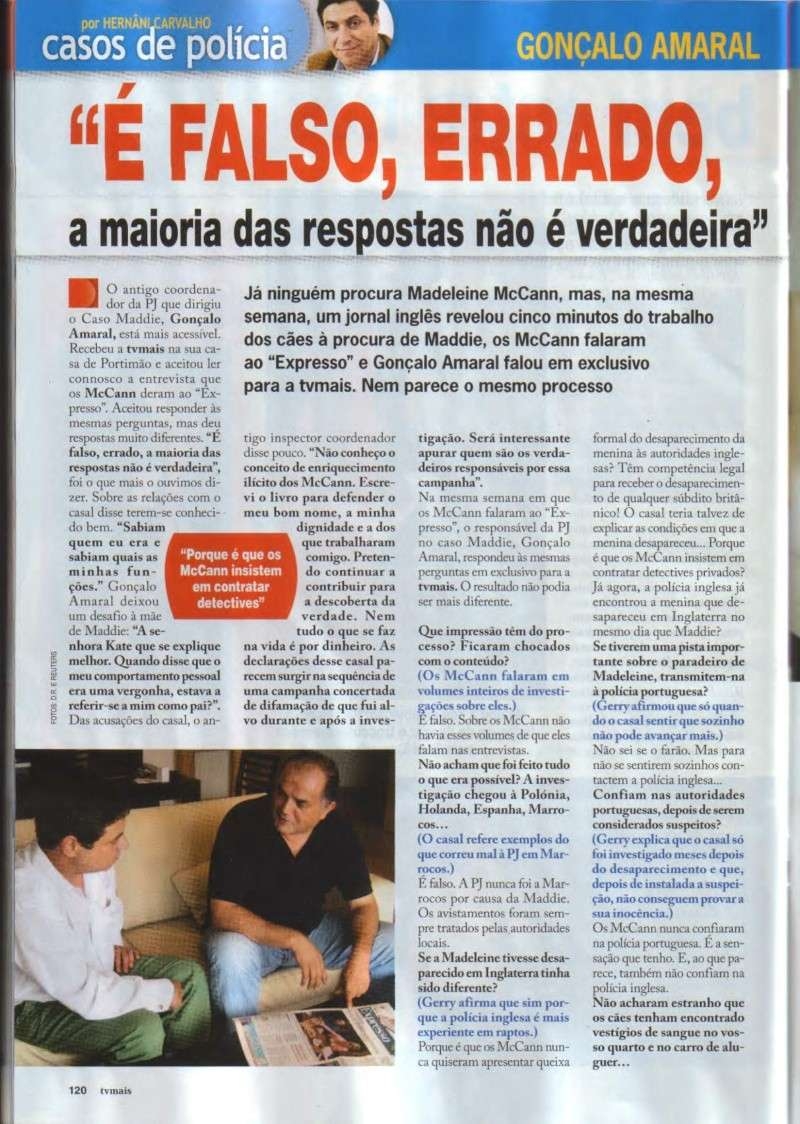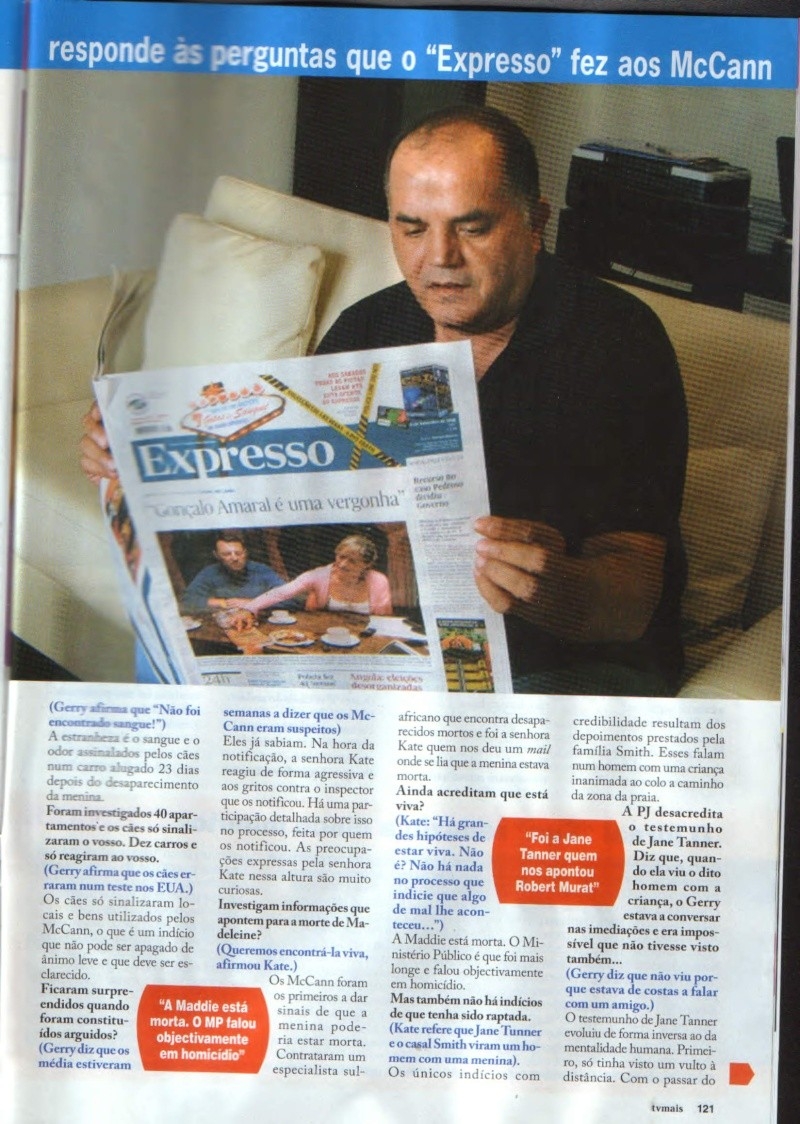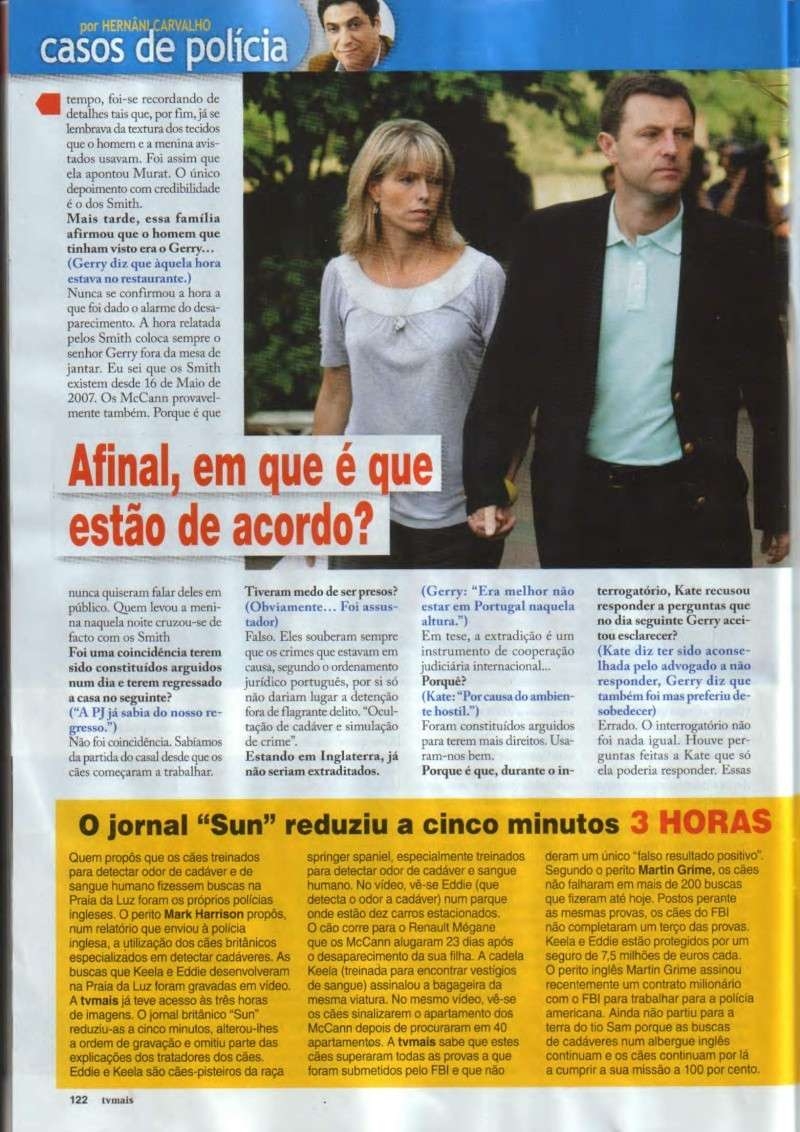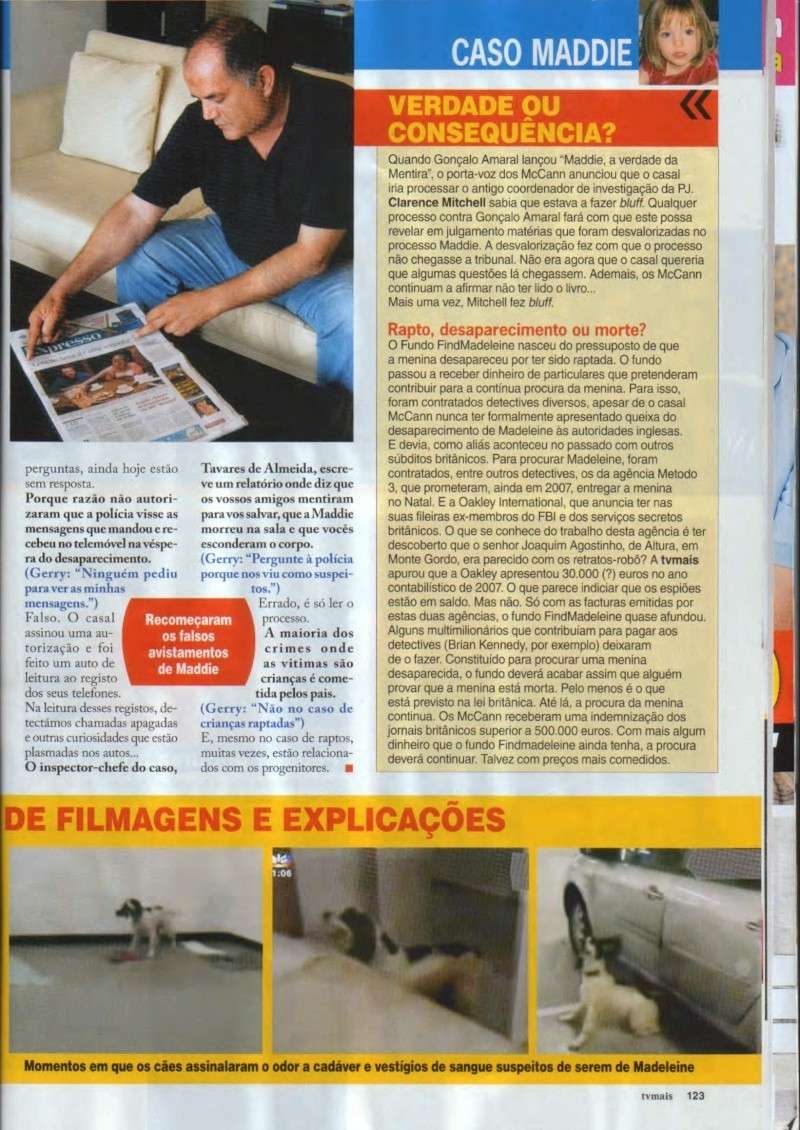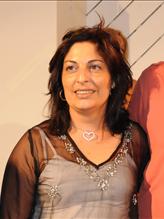Q – If Madeleine had disappeared in England, would things
have been different?
Gerry – If it had happened in a British city, I have no doubts. But I don't
know if it would have been different if we had been in a small village in Scotland. Clearly, the English police are more experienced
in abductions, they are more alert.
Q – If you have an important clue concerning Madeleine's whereabouts,
will you transmit it to the Portuguese police?
Gerry – If something needs to be done in Portugal, we'll have to. We cannot
go around breaking doors down or arresting people. But only when we feel that we cannot advance any further on our own.
Q – Do you trust the Portuguese authorities, after having
been considered suspects?
Gerry – We wouldn't mind if we had been investigated at the beginning, if
they thought that could help. But months later, when the evidence had been lost? It's that once the suspicion is installed,
we can never prove our innocence again.
Q – Didn't you find it strange that the dogs found traces of
blood in your room and in your rental car…
Gerry – There was no blood found! The indicia are worthless if they are
not corroborated by forensic information. And they were not.
Q – 40 apartments were investigated and the dogs only marked
yours. Ten cars and they only reacted to yours.
Gerry – These dogs' frailty was proved by a study that was carried out in
the USA, in the case of a man that had been accused of murder. They had ten rooms, and in each room four boxes were placed,
containing vegetables, bones, trash. Some contained human remains. They stayed there for ten hours. Eight hours after the
boxes were removed, the dogs came in. And the dogs failed two thirds of the attempts. Imagine the reliability when these dogs
test an apartment three months after the disappearance of a child.
Q – Were you surprised when you were made arguidos?
Kate – It was not surprising after weeks with the media saying that we were
suspects. And there we have to ask why the information that reached the media was disfigured. Why do the newspapers say that
blood was found in the apartment when the police report does not confirm it? Why was it said that the DNA that was found in
the car was a 100% match with Madeleine's?
Gerry – In a way, we would like to have been accused so we could defend ourselves openly. Now, reading the process,
there is no evidence that justifies the suspicion, apart from the dogs' action. There was never a sustained explanation. And
the questioning: 'What happened to Madeleine? How did you get rid of her? Who helped you? Where did you put her?' All fantasy!
If they had found DNA – so what? And if Madeleine had hurt herself inside the apartment – why would that be our
fault?
Q – Do you investigate information that point towards Madeleine's
death?
Kate – We want to find her alive, but if she is dead we want to know.
Q – Do you still believe that she's alive?
Kate – There are great possibilities that she is alive, aren't there? There
is nothing in the process to indicate that something bad has happened to her…
Q – But there are no indicia that she has been abducted, either.
Gerry – We firmly believe that she was abducted by a man, minutes after
I went to see her in the bedroom. There are two independent witnesses that saw a child of around four years of age being carried
that evening. Our friend Jane Tanner and also the Smith family.
Q – The PJ discredits Jane Tanner's testimony. They say that
when she saw said man with the child, you [Gerry] were chatting nearby and it was impossible that you hadn’t seen him
as well…
Gerry – I didn't see her because my back was turned to the location where she passed. I was talking to a friend.
And there is also the couple with children that saw a man carrying a child with pyjamas that were similar to Madeleine's,
blond hair, the same age.
Q – Later on, that family stated that the man they saw was
Gerry…
Gerry – At that time I was at the restaurant. The fact that we became suspects
has probably influenced the Smiths' testimony.
Q – Was it a coincidence that you were made arguidos on
one day and returned home the next day?
Gerry – They questioned us on that day because the PJ knew about our return.
Q – Were you afraid of being arrested?
Kate – Obviously. At a certain point we didn't know very well what could
happen.
Gerry – From the information in the newspapers, of course we were afraid. It was scary.
Q – Being in England, you would not be extradited anymore.
Gerry – We asked the inspector that was in charge of the case if he had
any objection: the answer was no. It's obvious that we were afraid that people might think we were escaping, but it was better
not to be in Portugal at that point in time.
Q – Why?
Kate – Because of the hostile environment. We couldn't even leave the house.
Q – Why did Kate refuse to answer questions during your interrogation,
that Gerry accepted to clarify the next day?
Kate – I was advised by my Portuguese lawyer not to reply.
Gerry – I received the same advice but decided to disobey. My plan was to remain silent, but the first question
was: 'Are you involved in your daughter's disappearance?' It was nonsense and I decided to answer. From there onwards, I replied
to all of them.
Q – Why didn't you authorise the police to
see the messages that you sent and received on your mobile phone on the eve of Maddie’s disappearance.
Gerry – Nobody asked to see my messages. On the day before and on the day
of the disappearance I did not receive or send 16 messages. I could hardly write a text message. I received three or four
phone calls and two were from work. After the disappearance I received hundreds. And when the police asked me for the registry,
I told them to ask the service provider. My phone only registers the last ten.
Q – The chief inspector in the case, Tavares de Almeida, writes
a report where he says that your friends lied to save you, that Maddie died in the living room, and that you hid the body.
Gerry – What can we say? You will have to ask the police chiefs why they
wrote that, why they saw us as suspects.
Q – The majority
of crimes where the victims are children are committed by the parents.
Gerry – Not in the case of abducted children. And this is a case of an abducted
child. It's an exceptional case.
Q – When he archived the case, the prosecutor said that the
investigation can be reopened if a new clue appears. Do you think that is possible?
Kate – Of course! It could happen at any moment. All that it takes is for
one person to make the phone call that we wait for so much. We know that she was abducted in Portugal and we vehemently believe
that someone knows or suspects something.
*
"Mr Amaral's behaviour is a disgrace"
They
have not read the book that is a best-seller in Portugal. And they don't spare the author and former PJ inspector
Q – Former inspector Gonçalo Amaral remains convinced of your involvement
in Madeleine's disappearance. Did you read 'The Truth of the Lie', the book that he wrote?
Kate and Gerry – No.
Kate – Why would I?
Gerry – I won't learn anything from reading it.
Q – It was a success in Portugal.
Gerry – Was it? How many copies did it sell?
Q – Approximately 200 thousand. Next week, it is released in Spain.
Gerry – That is what can be called illicit enrichment.
Q – Your English lawyers already have a translated copy and
they are analysing it. Do you intend to sue Gonçalo Amaral?
Gerry – At this moment we are focused on what we can do to find Madeleine
and not in suing anyone.
Kate – All that I am going to say about this – because I'm not going to waste any time on Mr Amaral –
is that as a professional and as a person his behaviour has been a disgrace.
Q – Aren't you curious to know what the book says?
Kate – What for? It must be nothing but a load of rubbish. It is so secondary…
It certainly won't help to find our daughter. My consolation is that on the cover he calls her Maddie, the name that the media
have invented. We never called her anything like that.
Q – But you do know the theory that Gonçalo Amaral defends:
Madeleine accidentally died in the Ocean Club apartment and you concealed the body.
Gerry – It really is a waste of time. And we need all the time that we can
get to analyse the investigation's documents, which contain a lot of information that we didn't know about.
Kate – You just have to cross, loosely, his theory with the process in order to understand that the facts that
he reports are not correct.
Q – There is a theory that defends that the coordinator
was removed from the investigation due to British political pressure.
Gerry – Who dismissed him?
Q –
The PJ's national director.
Gerry – Then you have to ask him if he was pressured. Or if Gordon Brown
discussed the case with him. He surely didn't.
Q – He also resigned. And largely due to this process.
Gerry – That was not what I was told. Apparently he had a vision of the
police itself that was different from the one held by the Justice Minister.
Q – In a final analysis, they both left the PJ because the
investigation failed.
Gerry – That's not our fault. I do not criticize the authorities over not
trying to find Madeleine. It doesn't matter anymore. Now all that matters is that we do everything to try to find her, through
our own methods.
Q – Did you ever get to know Gonçalo Amaral?
Kate – The question is the other way around: did he get to know us?
*
There are photographs of her all over the house
Gerry has returned to his work as a cardiologist. Kate did not exercise medicine again. Twins Sean and Amelie fill
up her days as a mother.
Q – How has your life changed
with the disappearance of Madeleine?
Gerry – Independently of what happens, it will never be the same again.
If you talk to the parents of other abducted children, they also mention this parallel life which we entered. Sean and Amelie,
being so young, force us to introduce a certain normality in our lives, to make it normal for them. And it's them who, for
moments, make it normal for us. But it will never be normal for us. They are aged three and a half, and they are very, very
happy.
Q – Did you explain to the twins what happened to
their sister?
Kate – They perceive Madeleine's absence perfectly. I have no doubt whatsoever.
But they don't know the details. They know that she disappeared and that we're looking for her.
Gerry – We were advised concerning what we should tell them, how and when. Larger explanations are kept for later.
We realise that they miss their older sister. They know that her not being with us is not a good thing, and they hope that
she returns.
Q – How do you keep Madeleine present in your lives?
Kate – There are photographs of her all over the house. And we speak about
her with the twins every day – it's an important part of their lives. Sean and Amelie talk about her and still include
her in their playing… If they receive sweets, they say "Let's keep one for Madeleine". Or "When she comes home I'll
give her this or that". It's endearing and it makes our days less difficult.
Q – Did you fear that you might lose custody over Sean and
Amelie because your behaviour was considered to be negligent?
Gerry – We were not negligent, we did what any reasonable parent would do.
But we deeply regret what happened, because in our action, someone saw an opportunity to take Madeleine. I'm an optimistic
person. I never thought that something like this could happen.
Q
– Did you change the manner in which you deal with Sean and Amelie?
Gerry – We are more protective and less trusting. We never left our children
alone again and many families will never do so again because of us.
Kate – Now we think about everything that can happen, about predators, abductors. We don't even let go of them
in the shopping centre.
*
€1.200.000
The McCanns
say that the fund has spent €1.2 million with the private investigation. But the reward of €3 million still stands
Q – How much have you spent on the private investigation so far?
Gerry – Approximately one million pounds, over the past ten months, paid
with money from the Find Madeleine fund. A substantial sum was also spent on our defence, but two benefactors have covered
that expense, which means that the fund was solely used in the search for our daughter.
Q – Do you maintain the offer of 2.5 million ponds to whoever finds Madeleine?
Gerry – We do not control that reward, but everything leads me to believe
that it still stands. And that there will also be money available for whoever supplies credible information.
Kate – It's a lot of money, but we cannot set limits, a child is priceless. We'll pay whatever is necessary.
Q – Is there still money left in the fund?
Gerry – There is still some money left. Recently, British newspapers ('Express
newspapers') paid us compensation of 550 thousand pounds, which fed the fund. That had an important impact. And there are
still donations, people who send money directly.
Q – But
less than in the beginning, before you were made arguidos.
Gerry – Of course! Those who were in doubt stopped contributing. Many write
to us asking for forgiveness because they believed in our guilt. We know that we have to make an effort for people to know
that there is no evidence that Madeleine is dead and that we were not involved in the disappearance.
*
Other issues
Dogs
– "We read everything that we found about these dogs that detect cadavers. It was due to them that we became suspects"
Clues – "The sightings continue. Since May we received one
thousand phone calls and an equal number of emails, some containing relevant data"
Media exposure – "Appearing in the media was never good. We did it to publicise Madeleine's
face and to find her. We failed"
Background
Details of two hours of conversation
Kate
and Gerry are different. More relaxed, or conformed. It is difficult to tell. "The twins force us to a certain normality",
the mother explains. It's been 16 months and the mystery of the disappearance of Madeleine McCann remains unsolved.
The parents have already been victims of a tragedy and suspects of a terrible crime. The process was archived, but they
are judged every day. Gerry agrees: "From the moment when the suspicion is installed, we can never prove our innocence".
This is the first interview since the process was archived, on the 21st of July. It is scheduled in Rothley, a small
village in the British Midlands where nobody suspects the McCanns' guilt. Even less the owner of the Court House Hotel, which
is installed in a medieval building and where the interview is held, in the late afternoon last Monday. There is tea with
milk and biscuits. There is no guide and there are no forbidden questions.
In almost two hours of interview, Kate and Gerry, both 40, clearly state the intention that supports their availability
for the conversation. "We believe that in Portugal someone knows about Madeleine, that it is where the solution for our daughter's
disappearance lies". And they want that person, whether singular or collective, to know that they search for him, that they
ensure his anonymity and that they will even give him 2.5 million pounds if he tells them where Madeleine is.
Every day, in their very British house of little bricks, they study a little more of the process of the Polícia Judiciária's
investigation, which they personally consult as it is being translated. They understand "nothing" of Portuguese. From a first
reading they reinforced their hope of finding Maddie alive. Nothing tells them that she is dead. The volumes about themselves,
from the time when they were made arguidos, have been put aside. "We do not intend to read them".
They remind them of the days when they were afraid of being arrested in Portugal, accused of Madeleine's death.

